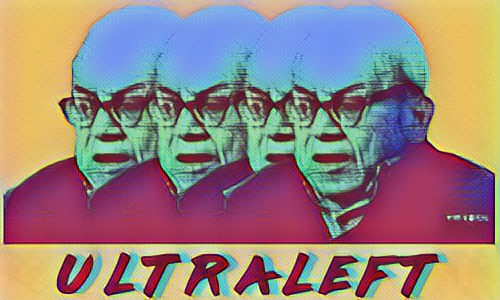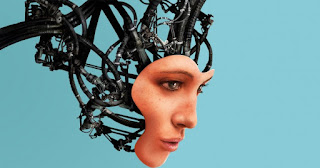O Superman! Nietzsche’s Übermensch
Nietzsche’s desire was for an ''Übermensch” — that is, for a new human who was to be neither master nor slave. This is the utopian New Humanity sought after by many ideologies but strangely enough by both Christianity and one of its harshest critics Friedrich Nietzsche. From Nietzsche’s phrase, “Death of God” philosophy seeks to reconcile a radical theism and a radical atheism. Nietzsche summons a "transvaluation of values," by which the individual is free to create in line with self-realization. As such an example of spiritual anarchism, Nietzsche’s Übermensch also influenced the expression of political anarchism.
Anarchist Emma Goldman, in the preface of her famous collection Anarchism and Other Essays, defends Nietzsche from attacks within anarchism when she says "Friedrich Nietzsche, for instance, is decried as a hater of the weak because he believed in the Übermensch. It does not occur to the shallow interpreters of that giant mind that this vision of the Übermensch also called for a state of society which will not give birth to a race of weaklings and slaves."
Murray Bookchin, in The Spanish Anarchists, describes prominent CNT–FAI member Salvador Seguí as "an admirer of Nietzschean individualism, of the superhombre to whom 'all is permitted'." Bookchin, in his 1973 introduction to Sam Dolgoff's The Anarchist Collectives, even describes the reconstruction of society by the workers as a Nietzschean project. Bookchin says that "workers must see themselves as human beings, not as class beings; as creative personalities, not as 'proletarians,' as self-affirming individuals, not as 'masses'. . .(the) economic component must be humanized precisely by bringing an 'affinity of friendship' to the work process, by diminishing the role of onerous work in the lives of producers, indeed by a total 'transvaluation of values' (to use Nietzsche's phrase) as it applies to production and consumption as well as social and personal life."
Through the “transvaluation of values” the Übermensch overcomes the tyranny of the patterns of this world. Nietzsche introduces the concept of the Übermensch in contrast to his understanding of the other-worldliness of Christianity. Thus Spoke Zarathustra proclaims the will of the Übermensch to give meaning to life on earth, and admonishes his audience to ignore those who promise other-worldly fulfillment to draw them away from the earth. The turn away from the earth is prompted, he says, by a dissatisfaction with life that causes the sufferer to imagine another world which will fulfill his revenge. The Übermensch grasps the earthly world with relish and gratitude.
Zarathustra ties the Übermensch to the death of God. While the concept of God was the ultimate expression of other-worldly values and their underlying instincts, belief in God nevertheless did give meaning to life for a time. "God is dead" means that the idea of God can no longer provide values. With the sole source of values exhausted, the danger of nihilism looms.
Zarathustra presents the Übermensch as the creator of new values to banish nihilism. If the Übermensch acts to create new values within the moral vacuum of nihilism, there is nothing that this creative act would not justify. Through the "transvaluation of values," the Übermensch represents an ideal for anyone who is creative and strong enough to fulfill the whole spectrum of human potential, good and "evil", to become an "artist-tyrant”- indeed an individualist anarchist.
Drawing upon the work of Friedrich Nietzsche, Friedrich Schelling, and Jacob Boehme, Paul Tillich developed a notion of God as the "ground of Being" and the response to nihilism. Central to this notion was Tillich's rejection of traditional theism and insistence upon a "God above the God of theism." In The Courage to Be he writes: “The courage to take the anxiety of meaninglessness upon oneself is the boundary line up to which the courage to be can go. Beyond it is mere non-being. Within it all forms of courage are re-established in the power of the God above the God of theism. The courage to be is rooted in the God who appears when God has disappeared in the anxiety of doubt.” Through overcoming nihilism we overcome the death of God. We affirm our New Humanity and through the transvaluation of values we transcend atheism and theism. The Übermensch has the courage to be.
In the 19th century, "Death of God" thought entered the philosophical arena through the work of German philosopher Georg Wilhelm Friedrich Hegel. Hegel sought to revise Immanuel Kant's Idealism through the introduction of a dialectical methodology. Adapting this dialectic to the chief theological problem, the nature of God, Hegel argued that God (as Absolute or Father) is radically negated by the concrete incarnation of God (as Christ or Son). This negation is subsequently itself negated at the Crucifixion of Jesus, resulting in the emergence of the Holy Spirit, God as both concrete (the church) and absolute (spiritual community). In Hegelian thought, therefore, the death of God does not result in a strict negativity, but rather, permits the emergence of the full revelation of God: Cosmic Consciousness.
“God is dead. God remains dead. And we have killed him. Yet his shadow still looms. How shall we comfort ourselves, the murderers of all murderers? What was holiest and mightiest of all that the world has yet owned has bled to death under our knives: who will wipe this blood off us? What water is there for us to clean ourselves? What festivals of atonement, what sacred games shall we have to invent? Is not the greatness of this deed too great for us? Must we ourselves not become gods simply to appear worthy of it?”
— Nietzsche, The Gay Science
Life is that which overcomes itself- constantly regenerating. Man came from ape but what comes after man? Nietzsche would say that it’s the Übermensch, which is the next evolution of life. None of us will be the Übermensch but we can be the catalyst for its chemical reaction, we can become the fruit that carries the seed of a sweeter future, we can be the clouds out of which the lightening comes. Before we can give birth to the Übermensch we have to become free spirits.
The Übermensch is an evolutionary breakthrough on the way to something like Tielhard’s Omega Point. The New Human generates new values, gives their own law, creates themselves, and participates in evolution. Nietzsche writes “I love him who works and invents that he may build a house for the übermensch and prepare earth, animals and plants for him...” New Humanity is an evolutionary development which unites the New Heavens and the New Earth.



Comments
Post a Comment